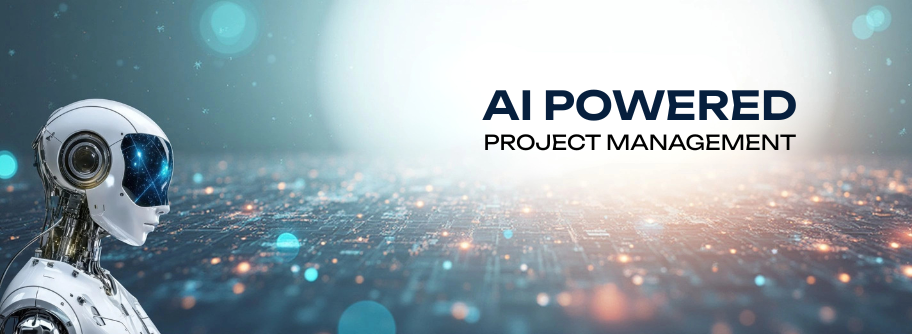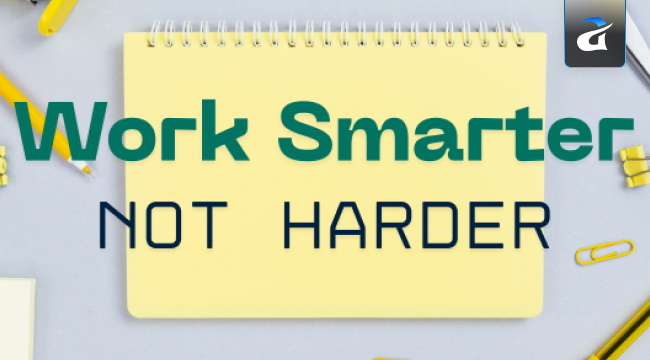So, how to break through this unsparing loop of non-alignment? We have the best solution for you.
AI-powered project management (MM) is finally here. For what it is worth, AI brings structure, clarity, and automation to your work to make things easier and smarter for you. What is more astonishing is the fact that it plans smarter schedules for you, assigns tasks intelligently, sends updates, and even predicts delays before they happen. So, congratulations, because you no longer have to worry about tracking your progress, as AI is already doing that for you!
This, my folks, is known as working smarter, not harder, and the sooner you realize it’s worth it, the faster you’ll get a step ahead of everyone! Thus, without further ado, let’s find out everything that you must know about AI-Powered Project Management (MM).

Why Businesses Are Adopting AI Project Management
You don’t really need digital transformation. You can keep working the old way—slow approvals, making futile guesses rather than using real data, and having to clean a massive and time-consuming fiasco all because you didn’t see the problem arriving earlier. Then, eventually, you see your deadlines slipping away, teams losing track of tasks, and clients leaving you quietly. But it’s just part of the job, right?Unless:
You use AI project management. With AI-powered project management, you can:
- Automate daily and repetitive work.
- Improve planning and timeline accuracy.
- Reduce communication gaps.
- Forecast budget and resource needs.
- Optimize productivity and project success rate.
How AI-Powered Project Management Actually Works
AI does not “guess.” It collects data from projects, analyzes performance patterns, and learns over time. When used correctly, it becomes a digital assistant that:- Sends reminders.
- Suggests the best timelines.
- Highlights risks.
- Recommends resource allocation.
- Tracks progress in real time.
Automated Project Management: Reducing Manual Work
In traditional software management systems, teams spend time updating tasks, writing reports, building schedules, and tracking individual performance.With automated project management, AI takes over tasks like:
- Auto-assigning work based on workload.
- Generating project reports.
- Sending task follow-ups.
- Tracking deadlines.
- Updating progress dashboards.
Intelligent Task Scheduling for Better Productivity
Deadlines slip when schedules are built manually. AI provides intelligent task scheduling by learning:- How long tasks usually take.
- Which team member performs best on certain jobs.
- Dependence between tasks.
- Potential delays based on past patterns.
AI Workflows: Streamlining Team Operations
Rather than going in circles of checking emails and planners and thoroughly reviewing suffocating spreadsheets, AI workflows choose to dodge this misery and bring everything into one, singular space. Sounds neat, right?- Trigger tasks automatically.
- Move items between project stages.
- Notify the next person when previous work is finished.
- Tag teammates when action is required.
AI in Goal Planning and Strategy Alignment
A major part of managing a project is aligning tasks with goals.Using goal planning powered by AI, managers can:
- Break large goals into smaller steps.
- Assign them to responsible teams.
- Predict which goals are at risk.
- See real-time achievement progress.
Project Scheduling and Risk Prediction
I believe you can understand me when I say that no teams should ever be caught off guard by problems they could have prevented. This is why predictive analytics is very important—and even better is AI predictive analytics.Most teams only realize a risk after it has already caused delays or budget losses—and by then, it’s too late to fix the damage. With AI predictive analytics, you can easily avoid any future issues that are prone to damage. By studying past project data, workload patterns, time estimates, and resource usage, AI flags risks before they come near your work.
In practice:
- If a task has a history of delays, AI marks it as high-risk.
- If a team member is overloaded or double-booked, the system alerts the project manager.
- If spending rises beyond planned levels, AI sends data-based warnings, as noted by the Project Management Institute (PMI).
- This way, there is no need to make unreliable guesses, and if any bug is felt, then immediate action can be taken.
AI in Software Management and Development Teams
When it comes to software development and management, AI means a lot more than a mere 21st-century trend.We can already see a myriad of modern development platforms that have integrated machine learning in order to automate repetitive work, improve code quality, and make delivery of projects swift.
Here’s how AI supports software teams in real environments:
- Error and bug detection: AI-powered testing tools, like DeepCode, use machine learning to find any vulnerabilities and coding issues much quicker and make a report of their findings.
- Dividing problems into chunks: AI-powered platforms actually transform user stories and bugs into organized tasks with priority labels.
- Sprint planning and workload forecasting: With AI, managers can plan and set tasks and deadlines under realistic boundaries.
- Auto-prioritizing tasks: AI is used by tools like Linear and Azure DevOps to determine whether features or problems are essential based on risk and impact.
- Recommending release dates: AI forecasts launch readiness by taking into account code commits, testing status, and development velocity.
- Monitoring code modifications and test coverage: Microsoft's DevOps tools and GitHub's Copilot examine repositories and test outcomes to inform teams about performance and quality.
Planning Apps: Using AI for Personal and Business Productivity
The impact of generative AI for personal and business productivity seems to be bearing fruits of satisfaction.It’s incredible to know that with AI agent tools, you and your business can:
- Track habits.
- Automate reminders.
- Prioritize daily tasks.
- Predict workload.
- Build work-life balance.
Real Business Benefits of AI Project Management
Businesses adopting AI see real outcomes:- Faster task completion.
- Better decision-making.
- Higher team productivity.
- Reduced workload for managers.
- On-time deliveries.
- More accurate reporting.
Industries Using AI Project Management
- IT and software companies.
- Construction & engineering.
- Marketing and creative agencies.
- Healthcare management.
- Education and e-learning.
- Event planning firms.
- Remote teams and freelancing groups.
Challenges When You Adopt AI (and Solutions)
| Challenge | How AI Solves It |
| Employees are not used to automation | User-friendly interfaces and training programs make adoption easier. |
| Fear that AI will replace jobs | AI supports humans by removing repetitive work—not replacing people. |
| Cost of implementation | Cloud-based AI platforms reduce infrastructure and setup costs. |
| Data vulnerability | Encrypted storage, secured cloud systems, and compliance frameworks protect data. |
| System integration | Most AI tools connect with existing software like Slack, Jira, Trello, ERP, CRM, and HRM. |
| Lack of AI skills or expertise | Platforms now offer no-code AI tools so non-technical teams can use them. |
| Concerns about accuracy or decision-making | AI uses real-time data, historical patterns, and predictive analytics to improve precision. |
| Unclear ROI in early stages | AI provides analytics and performance reports to track improvement over time. |
Future of AI in Managing a Project
AI is not stopping at automation. Future tools will offer:- Self-running workflows.
- Smart resource predictions.
- Voice-controlled task creation.
- Fully automated meeting summaries.
- AI assistants assigning and approving tasks.
- Real-time talent recommendations.
ManageMinds: AI-Powered Project Management Platform
While ordinary project management tools only track tasks, ManageMinds thinks, predicts, and reminds. Every user gets a deeply intuitive personal dashboard where multiple projects, tasks, and progress live in one clean view. One check-in and check-out each day is all it takes—the platform automatically builds precise attendance and task-hour reports you can trust.But what truly sets ManageMinds apart is its proactive AI.
It doesn’t wait for mistakes—it prevents them. Forgot to log hours? AI alerts you. Task left incomplete? ManageMinds has got your back! Through automated emails, it reminds you of every missing hour, incomplete task, and project so that you don’t fall behind!
Why teams love ManageMinds:
- Personal dashboard designed for clarity and speed.
- Add and manage multiple projects with zero confusion.
- One-tap daily check-in/check-out.
- Auto-generated attendance & task-hour reports.
- AI reminders for unlogged hours and unfinished tasks.
- Managers can monitor progress and send feedback instantly.
Final Thoughts
There you go! As you can see, AI-powered project management is becoming the norm rather than the exception. Teams who use AI workflows are more accurate, stronger, and faster. AI helps you work smarter, not harder, regardless of whether you utilize planning apps for basic goal planning or fully automated project management solutions. Companies that use AI now maintain an advantage over those that continue to rely on manual processes.Got more questions? Get in touch with us!
Frequently Asked Questions
What are the 5 C's of project management?
The 5 C’s framework defines project management through its five essential elements, which include Clarity, Communication, Collaboration, Control, and Commitment. The definition of Project Clarity requires organizations to establish clear goals and determine their project scope and team members. The project benefits from open information exchange between all parties who show interest in its progress. The different teams need to work together and maintain coordination according to Collaboration principles. The project requires progress tracking and risk management, and timely completion according to Control principles. All team members need to dedicate their commitment to reaching the project's targets.
How is AI used in project management?
AI is applied in the area of project management to take over the mundane, repetitive tasks like planning and reporting, forecasting project problems and delays based on past projects data, making the most out of the resources and budget, evaluating the productivity of team members, and giving smart suggestions for improving the decision-making process.
What jobs will AI replace in project management?
AI is predicted to take over certain tasks within project management instead of the whole role. These tasks are project scheduling, task assignment, tracking and reporting of progress, basic data analysis regarding project performance, and reminders or follow-ups of routine communication.
What are the 4 types of AI?
AI exists in four distinct categories, which include Reactive AI, Limited Memory AI, Theory of Mind AI, and Self-Aware AI. The system operates based on current conditions through Reactive AI because it lacks memory capabilities. The system uses past data to generate predictions through its Limited Memory AI functionality. Theory of Mind AI operates by attempting to understand human emotional responses and predict their intentions. Scientists have not yet developed Self-aware AI because it represents a fictional concept that grants consciousness and self-awareness to systems.
What is the 30% rule for AI?
The AI 30% rule states that business AI adoption can be such that it does not interfere with human supervision and that it can automate up to 30% of work, as per the guideline for maintaining human control along with efficiency gains.



